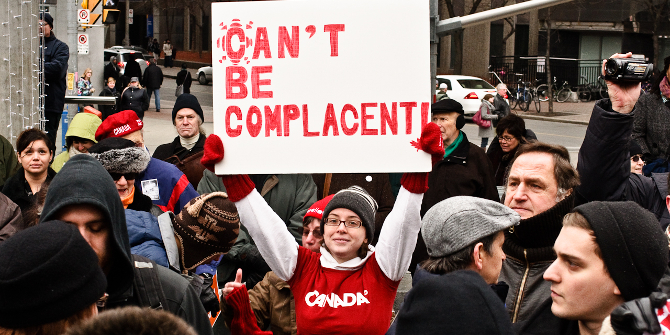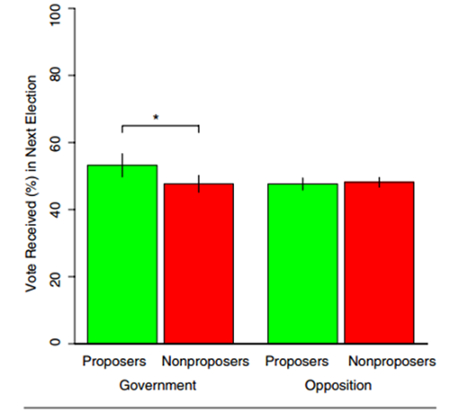
 It is generally accepted that constituents punish and reward their elected representatives at the ballot box for their legislative actions. But there is surprisingly little research on the link between politicians’ legislative activities and their chances of re-election. Using evidence from Canada, and by controlling for other influences on election vote shares, Peter Loewen and Royce Koop find that those MPs that are able to introduce legislation via private members (the ‘power to propose’) bills do reap a small reward in their subsequent elections.
It is generally accepted that constituents punish and reward their elected representatives at the ballot box for their legislative actions. But there is surprisingly little research on the link between politicians’ legislative activities and their chances of re-election. Using evidence from Canada, and by controlling for other influences on election vote shares, Peter Loewen and Royce Koop find that those MPs that are able to introduce legislation via private members (the ‘power to propose’) bills do reap a small reward in their subsequent elections.
Once elected, democratic representatives take a range of actions in their legislatures that may or may not be popular with their constituents back home. A fairly uncontroversial notion in democratic theory is that those constituents use re-elections as opportunities to either reward or punish representatives for their legislative actions. Indeed, representative democracy makes little sense if citizens’ don’t respond to their representatives’ behavior while in the legislature.
Despite the foundational and uncontroversial nature of this claim, the link between legislative action and re-election outcomes has not in fact been demonstrated empirically. Indeed, political scientists have found it difficult to demonstrate that citizens do use elections to reward or punish representatives for their legislative actions. This is because observational studies cannot separate out the effects of legislative actions versus other potential variables affecting re-election outcomes, such as their vote share in the last election and whether or not they are a member of the governing party. What has been needed is a way to separate the independent effects of legislative action on subsequent re-election outcomes.
In a recent study, we and our co-authors, Jaime Settle and James H. Fowler, harness a unique natural experiment to demonstrate how legislative action affects subsequent electoral outcomes. Since 2004, the right of non-cabinet members of the Canadian Parliament to introduce private members bills (PMBs) has been determined randomly by lottery. MPs’ names are randomly selected at the commencement of each Parliament and the order in which they are drawn forms the Order of Precedence, the order in which MPs are permitted to introduce private members bills or motions in the Parliament. This element of randomness allows us to compare the subsequent vote outcomes of both MPs who had the right to introduce a bill and those we were not afforded such a right. This institutional characteristic of the Canadian parliament allows us to assess experimentally whether one form of legislative action subsequently leads to enhanced vote shares. We demonstrate that being provided with the right to introduce a single private members bill—known as being given the power to propose–affords members of the governing party a substantial electoral advantage in subsequent re-election campaigns.

Our data is drawn from the 38th (2004-2006) and 39th (2006-2008) Canadian Parliaments, during which the lottery system was in effect. MPs were placed in the treatment group if they had both the right and the opportunity to introduce a PMB–the last MP included in treatment was lowest on the Order of Precedence but who nevertheless had his bill read for a second time. In total we have 79 MPs in the treatment and 127 in the control groups for the 38th and 86 MPs and 112 MPs in control for the 39th Parliament.
We hypothesize that, given the centrality and dominance of governments in the Canadian political system, being afforded the power to propose will lead to increased vote shares for MPs in subsequent elections. To test this, we examine vote share in previous election, membership in the governing party, the “power to propose” and an interaction between governing party and proposal power. Figure 1 illustrates the result of t-tests (a statistical test to determine if two sets of data are significantly different from each other) for the effect of proposal power on subsequent vote shares. The raw estimate of the power to propose suggests an increase in government members’ subsequent vote shares by 5.3 percent. There is no effect for opposition members.
Figure 1: Electoral vote share by government membership and assignation of right to propose legislation

Note: The results show that government members who are granted the power to propose earn a significantly greater voter share than others
As there does appear to be some imbalance in our data, we also estimated treatment effects in an ordinary least squares regression framework. After controlling for other variables, the effect of proposal power is weakened to 2.7 percentage points, while still differing from 0.
We next sought to explain why introducing legislation positively affects MPs’ vote shares in subsequent re-election campaigns by identifying four potential mediators between legislative action and their vote shares: media effects, quality opponents, campaign resources, and candidate popularity. We tested these hypotheses in a variety of ways and found no evidence supporting the first three: we cannot show that the power to propose leads to more favourable media coverage, the dissuasion of quality challengers in subsequent elections, and an increase in subsequent campaign resources. We do, however, find evidence for the candidate popularity hypothesis: drawing on data from the Canada Election Study, we find that government members holding the power to propose are named more often by their constituents as “individually liked” more often than their counterparts lacking the power to propose (22.2 percent versus 15.8 percent).
This is the first study to demonstrate experimentally that what representatives do in their legislatures has an independent effect on how they are subsequently regarded by voters. While our findings are consistent with the commonly accepted notion of voters paying attention to their representatives’ legislative actions and responding when provided with the opportunity, ours is the research to cleanly test whether this relationship is in fact a causal one. Our results are intuitive but offer a much-needed confirmation of the widely held theory that voters hold representatives accountable for their legislative action. Furthermore, that such an effect results from the introduction of a single piece of legislation in as highly a centralized and party-dominated legislature as Canada’s suggests that similar if not stronger effects will be found in other democratic systems, notably the U.S.
This article is based on the paper “A Natural Experiment in Proposal Power and Electoral Success,” which appeared in the American Journal of Political Science.
Please read our comments policy before commenting.
Note: This article gives the views of the authors, and not the position of USApp– American Politics and Policy, nor of the London School of Economics.
Shortened URL for this post: http://bit.ly/1e8Ccls
________________________________
 Peter Loewen- University of Toronto- Mississauga
Peter Loewen- University of Toronto- Mississauga
Peter Loewen is an assistant professor of political science at the University of Toronto-Mississauga. His research interests focus on political psychology and behavior, especially in Anglo-American democracies, behavioral economics, public opinion, genopolitics, and experimentation.
_
 Royce Koop – University of Manitoba
Royce Koop – University of Manitoba
Royce Koop is an Assistant Professor in the Department of Political Studies at the University of Manitoba. His research interests include political parties (particularly their grassroots organizations), representation, municipal politics, federalism, and online political communication.



